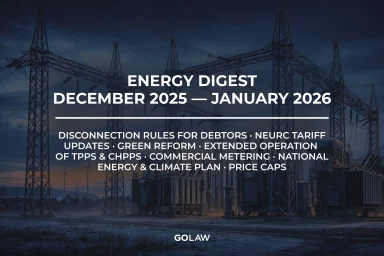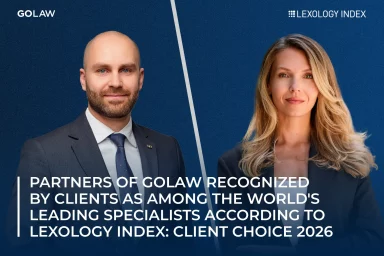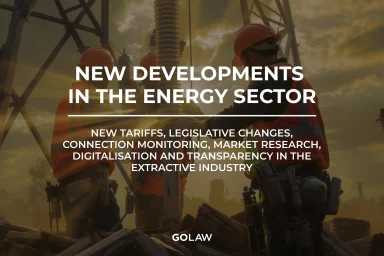Disputes in the field of green energy: case law in 2024
Contents
- Regarding final payments for electricity by the Guaranteed Buyer during the period of martial law
- Regarding the reference of the Guaranteed Buyer to martial law in Ukraine as a force majeure circumstance
- Regarding the reference of the Guaranteed Buyer to the right of the court to reduce the amount of 3% annual and inflationary losses
Most of the court cases initiated by electricity producers under the feed-in tariff relate to the recovery of debts for electricity supplied from the State Enterprise Guaranteed Buyer (hereinafter also referred to as Guaranteed Buyer).
During the period of martial law in Ukraine, the number of such court cases has increased exponentially. According to the information posted on the official website of the Guaranteed Buyer, as of December 31, 2024, the Guaranteed Buyer paid only 62.2% of the total debt to producers under the feed-in tariff for 2022, 95.3% for 2023 and 79.6% for 2024.
The situation with the debt in the green energy market is largely due to the financial difficulties of PrJSC National Energy Company Ukrenergo (hereinafter referred to as NPC Ukrenergo), whose debt to the Guaranteed Buyer as of December 31, 2024 reached UAH 22.08 billion.
In addition, for a long time, the Guaranteed Buyer did not fully pay the producers at the feed-in tariff for the supplied electricity, referring to the provisions of the Orders of the Ministry of Energy of Ukraine (hereinafter also referred to as the Ministry of Energy) No. 140 dated March 28, 2022 (effective until July 05, 2022) and No. 206 dated June 15, 2022 (effective until May 01, 2024).
These circumstances have led to a real boom in claims of producers under the feed-in tariff against the Guaranteed Buyer.
We propose to review the current court practice for 2024 in this category of cases.
Regarding final payments for electricity by the Guaranteed Buyer during the period of martial law
Until June 2024, there was a contradictory court practice on the issue of the right of producers under the feed-in tariff to receive 100% payment for electricity supplied during martial law.
The Guaranteed Buyer defended its position that it had the right to pay producers not in full, as the orders of the Ministry of Energy No. 140 and No. 206 allegedly changed the procedure for settlements with alternative energy producers both in terms of advance payments and final payments during the special period. In particular, the Guaranteed Buyer justified the legality of making payments during martial law as a percentage (from 18% to 75% depending on the type of RES) of the weighted average feed-in tariff for 2021.
At the same time, producers of electricity under the feed-in tariff insisted that the orders of the Ministry of Energy No. 140 and No. 206 in no way change or terminate the obligation of the Guaranteed Buyer to make the final payment for the electricity sold.
Due to the ambiguous court practice, one of these cases was referred to the Joint Chamber of the Commercial Court of Cassation of the Supreme Court (hereinafter also referred to as the JC CCC SC). It is worth noting that the interests of the plaintiff (an electricity producer under the feed-in tariff) in this case were represented by GOLAW attorneys.
In its ruling of June 21, 2024 in case No. 910/4439/23, the CGU SC put an end to the issue of unequal application of the above orders of the Ministry of Energy and came to the following conclusions:
– Orders No. 140 and No. 206, although they provide for the minimum payment to producers of electricity from alternative sources, do not release the Guaranteed Buyer from the obligation to make full payment;
– Order No. 206, as well as the previous Order No. 140, in no way restricts the right of the electricity producer under the feed-in tariff to receive the full cost of the sold electricity established by the agreement concluded by the parties to the case, and does not change the terms of occurrence and fulfillment of the Guaranteed Buyer’s monetary obligations to make final payments.
A similar position is also expressed in a number of resolutions of the CGS of the Supreme Court (for example, as of March 21, 2024 in case No. 910/6185/23, as of April 11, 2024 in case No. 910/9100/22, as of July 04, 2024 in case No. 910/9098/22, as of July 18, 2024 in case No. 910/11150/23, as of July 30, 2024 in case No. 910/9725/23, etc.)
Thus, in the second half of 2024, a stable and unambiguous court practice has already been formed, according to which, during the period of martial law, the Guaranteed Buyer is obliged to pay in full to the producers for the supplied electricity.
Regarding the reference of the Guaranteed Buyer to martial law in Ukraine as a force majeure circumstance
In 2024, the Guaranteed Buyer continued to refer to the martial law in Ukraine as a force majeure circumstance, which is the basis for exemption from liability for failure to fulfill monetary obligations. In particular, in its argumentation, the company cited the Letter of the Ukrainian Chamber of Commerce and Industry dated February 28, 2022 No. 2024/02.0-7.1.
In the said letter, the Ukrainian Chamber of Commerce and Industry confirmed that the military aggression of the russian federation against Ukraine, which led to the introduction of martial law on February 24, 2022, is recognized as a force majeure circumstance (force majeure).
However, given the established approaches in court practice, it is the certificate of the Ukrainian Chamber of Commerce and Industry and its authorized regional chambers of commerce and industry that is the document confirming the occurrence of force majeure and the period of its validity. This conclusion has been repeatedly made by the Supreme Court in its rulings.
For example, in its ruling of March 21, 2024, in case No. 910/6185/23, the Supreme Court noted that the letter of the Ukrainian Chamber of Commerce and Industry No. 2024/02.0-7.1 dated February 28, 2022, provided by the Guaranteed Buyer, was not a proper and admissible evidence confirming the existence of force majeure circumstances.
In other words, the general letter of the Ukrainian Chamber of Commerce and Industry No. 2024/02.0-7.1 dated February 28, 2022 does not confirm the occurrence of force majeure under a particular agreement.
Regarding the reference of the Guaranteed Buyer to the right of the court to reduce the amount of 3% annual and inflationary losses
In litigations with producers under the feed-in tariff, the Guaranteed Buyer often refers to the need to reduce the 3% annual and inflationary losses due, citing part 3 of Article 551 of the Civil Code of Ukraine as a basis. This article allows the court to reduce the amount of penalty if it is excessively high. However, such references of the Guaranteed Buyer are legally unfounded, as 3% per annum and inflationary losses are not penalties, but a special form of liability for breach of a monetary obligation established by law.
Therefore, since inflationary charges on the amount of debt and 3% per annum provided for in Article 625 of the Civil Code of Ukraine are not penalties (fines), but are a way to protect the property rights and interests of the manufacturer, the respective amounts cannot be reduced by the court as fines.
Similar approaches are also taken by the courts in their decisions. For example, the Northern Commercial Court of Appeal in its decision of October 08, 2024 in case No. 910/3703/24 concluded that Ukrainian legislation provides for the right of the court to reduce penalties (fines, penalties), while the collection of 3% per annum is not a penalty, in particular a forfeit, but is a special measure of the debtor’s liability for the delay in the payment of a monetary obligation, as it is a way to protect property rights and interests, which consists in compensation for material losses of the creditor from the depreciation of funds due to inflationary processes and obtaining compensation from the debtor for improper performance of the obligation.
Similar legal conclusions are contained in the resolutions of the Supreme Court dated March 21, 2024 in case No. 910/6185/23, September 07, 2022 in case No. 910/9911/21, January 26, 2022 in case No. 910/4094/21, December 15, 2021 in case No. 910/4908/21, etc.
In addition, the Guaranteed Buyer’s references to the lack of necessary funds and martial law as a force majeure circumstance cannot be the basis for reducing or refusing to collect inflationary losses payable to the manufacturer and 3% per annum.
In view of the foregoing, in 2024, the courts resolved a number of legal issues in the relations between electricity producers under the feed-in tariff and the Guaranteed Buyer. This will undoubtedly contribute to the formation of a unified and stable judicial practice and effective protection of producers’ rights.
If you need legal advice, please fill out the form below to request it.

Kateryna Tsvetkova
Partner, Litigation and Dispute Resolution practice, Attorney at law
- Contacts
- 31/33 Kniaziv Ostrozkykh St, Zorianyi Business Center, Kyiv, Ukraine, 01010
- k.tsvetkova@golaw.ua
- +38 044 581 1220
- Recognitions
- Lexology Index: Client Choice 2026
- Lexology Index: Employment & Labor 2025
- The Legal 500 EMEA 2025
- Lexology Index: Restructuring & Insolvency 2026

Ilona Rudnyk
Lawyer, Attorney
- Contacts
- 31/33 Kniaziv Ostrozkykh St, Zorianyi Business Center, Kyiv, Ukraine, 01010
- i.rudnyk@golaw.ua
- +38 044 581 1220
Get in touch
To get a consultation, please fill out the form below or call us right away:Sign up to be aware
New achievements are inspired by information. GO further, don’t miss out GOLAW news and legal alerts
Our expertise
-
- Energy and Natural Resources
- Antitrust and Competition
- Banking and Finance
- Compliance, Corporate Governance and Risk Management
- Corporate and M&A
- Criminal and White Collar Defence
- Defense in Anti-corruption procedures and regulations
- Private: Digital Economy Practice
- Labor and Employment
- Natural Resources and Environment
- Government Relations (GR)
- Insolvency and Corporate Recovery
- Intellectual property
- International trade
- Legal support of business and private Сlients in Germany
- Litigation and dispute resolution
- Private clients
- Real Estate and Construction
- Restructuring, Claims and Recoveries
- Martial Law
- Tax and Customs
-
- Agribusiness
- Aviation
- Chemical industry
- Engineering, Construction and Building Materials
- Environment and Natural Resources
- Financial institutions
- IT and AI
- Industry and manufacturing
- Healthcare industries, Life sciences and Pharmaceuticals
- Media, Entertainment, Sports and Gambling
- Retail, FMCG and E-Commerce
- Transport and Logistics
We use cookies to improve performance of our website and your user experience.
Cookies policy
Cookies settings







